29.2.3.5.6 (29 > 52)
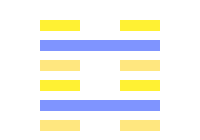
29.2.3.5.6 (29 > 52) - THE KHAN HEXAGRAM.
- 2. The second line, undivided, shows its subject in all the peril of the defile. He will, however, get a little (of the deliverance) that he seeks.
- 3. The third line, divided, shows its subject, whether he comes or goes ( = descends or ascends), confronted by a defile. All is peril to him and unrest. (His endeavours) will lead him into the cavern of the pit. There should be no action (in such a case).
- 5. The fifth line, undivided, shows the water of the defile not yet full, (so that it might flow away) ; but order will (soon) be brought about. There will be no error.
- 6. The topmost line, divided, shows its subject bound with cords of three strands or two strands, and placed in the thicket of thorns. But in three years he does not learn the course for him to pursue. There will be evil.
29.2.3.5.6 (29 > 52) - Spoiling prematurely
One exhausts one's guests by treating them like gods.
Bing DeepL Google Yandex29.2.3.5.6 (29 > 52) - Spoiling prematurely
One exhausts one's guests by treating them like gods.
Bing DeepL Google Yandex29.2.3.5.6 (29 > 52) - K’ân, l’abîme
K’ān : danger, précipice, caverne. — Tsa k’ān : courir de grands risques ; s’exposer au danger pour un autre.
-
2. Dans les écueils périlleux, si on sait modérer ses sentiments, on pourra en sortir heureusement.
Si on garde la modération. - 3. Si en tout et partout on ne rencontre que danger, que les périls, les sujets de crainte s’accumulent, alors dans un tel danger, il n’y a plus d’expédient qui puisse servir. — Il n’y aura plus de secours possible.
- 5. Mais si le danger n’est pas inéluctable, si une caverne où l’on se trouve n’est point pleine d’eau et qu’on puisse encore aplanir le terrain, on en sortira sans faute. — Il n’arrivera pas malheur.
- 6. Danger de celui qui, lié, vinculé de triples liens, enfermé dans un cachot, ne peut de longtemps parvenir à se délivrer. Sort funeste ! — Tel est celui qui a perdu la voie de la sagesse
29.2.3.5.6 (29 > 52) - Gâter prématurément
On épuise ses invités en les traitant comme des dieux.
Bing DeepL Google Yandex29.2.3.5.6 (29 > 52) - Mélység
- 2. Ha valaki túl nagy nehézségekkel kerül szembe, rá kell hagynia olyanokra akik tudják kezelni azokat.
- 3. Látják amit elrontott így odébbáll.
- 5. Mielőtt visszatérne hogy segítsen másokon, szünetet kell tartania és fel kell készülnie hogy válaszoljon a közelállóknak.
- 6. Ha túl fáradt, meg kell állnia és később folytatnia.
The trigrams
The trigrams are combinations of three yin and yang lines. The three bottom lines of the hexagram form the lower trigram and represent the inner situation. The three top lines form the upper trigram and represent the outer situation.
Upper trigram: The water The mountain


Lower trigram: The water The mountain


The formation: 29
What is already there
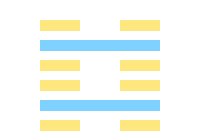
29 - THE KHAN HEXAGRAM.
Khan, here repeated, shows the possession of sincerity, through which the mind is penetrating. Action (in accordance with this) will be of high value.
Bing DeepL Google Yandex29 - K’ân, l’abîme
K’ān : danger, précipice, caverne. — Tsa k’ān : courir de grands risques ; s’exposer au danger pour un autre.
Texte
La droiture, le coeur fidèle et attaché, réussit ; ses actes ont de l’éclat s’il persévère malgré le danger.
Symbolisme
L’eau s’étendant au loin (deux fois eau) forme le Koua. Le sage, d’une vertu constante, agit vertueusement et s’applique à l’enseignement. Il répand ses biens comme l’eau.
Commentaire
Tsa k’ān est un danger grave. L’eau débordant, mais ne remplissant pas tout (que figure le Koua), représente les dangers courus sans qu’on perde sa fidélité constante. Le coeur attaché réussit ; quand la force garde le milieu, tout ce qu’on fait est bon et méritoire. Le ciel a ses dangers qu’on ne peut surmonter. La terre a les siens dans les montagnes, les fleuves et les ravins. Les rois et princes arrangent les choses dangereuses de manière à sauvegarder leurs États. Le moment du danger est bien grave.
29 - La profondeur
Quand les problèmes sont trop difficiles, on essaie de les contourner.
Bing DeepL Google Yandex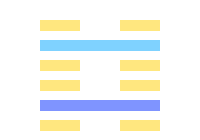
29.2 (29 > 8) - THE KHAN HEXAGRAM.
The second line, undivided, shows its subject in all the peril of the defile. He will, however, get a little (of the deliverance) that he seeks.
Bing DeepL Google Yandex29.2 (29 > 8) - Passing the buck
When one encounters difficulties that are too great, one leaves them to those who know how to handle them.
Bing DeepL Google Yandex29.2 (29 > 8) - Passing the buck
When one encounters difficulties that are too great, one leaves them to those who know how to handle them.
Bing DeepL Google Yandex29.2 (29 > 8) - K’ân, l’abîme
K’ān : danger, précipice, caverne. — Tsa k’ān : courir de grands risques ; s’exposer au danger pour un autre.
Dans les écueils périlleux, si on sait modérer ses sentiments, on pourra en sortir heureusement.
Si on garde la modération.
29.2 (29 > 8) - S'en remettre aux autres
Quand on rencontre des difficultés trop grandes, on laisse faire ceux qui savent les résoudre.
Bing DeepL Google Yandex29.2 (29 > 8) - Mélység
Ha valaki túl nagy nehézségekkel kerül szembe, rá kell hagynia olyanokra akik tudják kezelni azokat.
Bing DeepL Google Yandex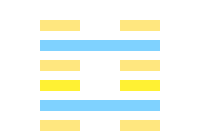
29.3 (29 > 48) - THE KHAN HEXAGRAM.
The third line, divided, shows its subject, whether he comes or goes ( = descends or ascends), confronted by a defile. All is peril to him and unrest. (His endeavours) will lead him into the cavern of the pit. There should be no action (in such a case).
Bing DeepL Google Yandex29.3 (29 > 48) - Leaving the field
Others notice what one has wasted, thus one leaves.
Bing DeepL Google Yandex29.3 (29 > 48) - Leaving the field
Others notice what one has wasted, thus one leaves.
Bing DeepL Google Yandex29.3 (29 > 48) - K’ân, l’abîme
K’ān : danger, précipice, caverne. — Tsa k’ān : courir de grands risques ; s’exposer au danger pour un autre.
Si en tout et partout on ne rencontre que danger, que les périls, les sujets de crainte s’accumulent, alors dans un tel danger, il n’y a plus d’expédient qui puisse servir. — Il n’y aura plus de secours possible.
Bing DeepL Google Yandex29.3 (29 > 48) - Abandonner le terrain
Les autres voient ce que l'on a gâché, alors on s'en va.
Bing DeepL Google Yandex
29.5 (29 > 7) - THE KHAN HEXAGRAM.
The fifth line, undivided, shows the water of the defile not yet full, (so that it might flow away) ; but order will (soon) be brought about. There will be no error.
Bing DeepL Google Yandex29.5 (29 > 7) - Going on vacation
Before returning to help others, one must take a break and prepare oneself to answer to one's relatives.
Bing DeepL Google Yandex29.5 (29 > 7) - Going on vacation
Before returning to help others, one must take a break and prepare oneself to answer to one's relatives.
Bing DeepL Google Yandex29.5 (29 > 7) - K’ân, l’abîme
K’ān : danger, précipice, caverne. — Tsa k’ān : courir de grands risques ; s’exposer au danger pour un autre.
Mais si le danger n’est pas inéluctable, si une caverne où l’on se trouve n’est point pleine d’eau et qu’on puisse encore aplanir le terrain, on en sortira sans faute. — Il n’arrivera pas malheur.
Bing DeepL Google Yandex29.5 (29 > 7) - Partir en congés
Avant de retourner aider les autres, on doit faire une pause et se préparer à répondre à ses proches.
Bing DeepL Google Yandex29.5 (29 > 7) - Mélység
Mielőtt visszatérne hogy segítsen másokon, szünetet kell tartania és fel kell készülnie hogy válaszoljon a közelállóknak.
Bing DeepL Google Yandex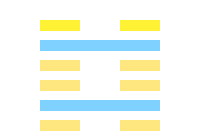
29.6 (29 > 59) - THE KHAN HEXAGRAM.
The topmost line, divided, shows its subject bound with cords of three strands or two strands, and placed in the thicket of thorns. But in three years he does not learn the course for him to pursue. There will be evil.
Bing DeepL Google Yandex29.6 (29 > 59) - Pausing
When it is too tiring, one can stop and resume later.
Bing DeepL Google Yandex29.6 (29 > 59) - Pausing
When it is too tiring, one can stop and resume later.
Bing DeepL Google Yandex29.6 (29 > 59) - K’ân, l’abîme
K’ān : danger, précipice, caverne. — Tsa k’ān : courir de grands risques ; s’exposer au danger pour un autre.
Danger de celui qui, lié, vinculé de triples liens, enfermé dans un cachot, ne peut de longtemps parvenir à se délivrer. Sort funeste ! — Tel est celui qui a perdu la voie de la sagesse
Bing DeepL Google Yandex29.6 (29 > 59) - Mettre en pause
Quand c'est trop fatiguant, on peut s'arrêter et reprendre plus tard.
Bing DeepL Google Yandex29.6 (29 > 59) - Mélység
Ha túl fáradt, meg kell állnia és később folytatnia.
Bing DeepL Google YandexIn the making: 52
What is poised to happen
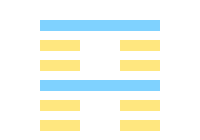
52 - THE KĂN HEXAGRAM.
When one's resting is like that of the back, and he loses all consciousness of self; when he walks in his courtyard, and does not see any (of the persons) in it, there will be no error.
Bing DeepL Google Yandex52 - Stop
One recognizes that it is time to stop because one needs to feed oneself.
Bing DeepL Google Yandex52 - Stop
One recognizes that it is time to stop because one needs to feed oneself.
Bing DeepL Google Yandex52 - Kán, l’arrêt
Kán : ferme, tenir droit, bien réglé, arrêter, reposer
Kan « ferme ». L’homme ferme tourne le dos et s’oppose résolument, sans tenir compte de lui-même. S’il traverse un endroit, il ne regarde pas qui y est et ne faillit point.
Texte
L’homme ferme s’oppose résolument (au mal) sans tenir compte de lui-même. Devant traverser un endroit, il ne regarde pas qui s’y trouve (mais le fait résolument) et ne faillit point.
Symbolisme
Deux montagnes superposées forment le Koua. Ainsi l’homme supérieur pense à ne pas dépasser les bornes de ses fonctions.
Commentaire
Kán signifie s’arrêter, tenir ferme, en bon ordre, agir ou s’arrêter selon l’occasion. Quand l’acte et sa cessation ont lieu en temps convenable, la conduite est belle et intelligente. « Rester à sa place », cela veut dire que les grands et les petits sont en rapport, mais sans usurpation ni entre-croisement. Celui qui est ferme et attentif à son devoir ne se recherche pas lui-même. Marchant dans son jardin, il ne voit pas même qui s’y trouve.
Note. Tout ceci illustre le sens « tenir droit, bien réglé » et se réfère aux rites du maintien extérieur qui prescrivent de se tenir toujours droit et de ne pas même s’asseoir sur un siège qui n’est pas droit.
52 - Cesser
On reconnaît qu'il est temps de s'arrêter car on a besoin de s'alimenter.
Bing DeepL Google Yandex52 - Megállás
Felismeri hogy itt az ideje megállni mert a többieket táplálni kell.
Bing DeepL Google YandexThe nuclear hexagram: 27.1.2.4.6 (27 > 40)
The nuclear hexagram is the association of the two inner trigrams (lines 2,3,4 and 3,4,5). It represents the root, or the origin of the situation.
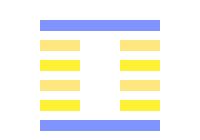
27.1.2.4.6 (27 > 40) - THE Î HEXAGRAM.
- 1. The first line, undivided, (seems to be thus addressed), ‘You leave your efficacious tortoise, and look at me till your lower jaw hangs down.’ There will be evil.
- 2. The second line, divided, shows one looking downwards for nourishment, which is contrary to what is proper ; or seeking it from the height (above), advance towards which will lead to evil.
- 4. The fourth line, divided, shows one looking downwards for (the power to) nourish. There will be good fortune. Looking with a tiger's downward unwavering glare, and with his desire that impels him to spring after spring, he will fall into no error.
- 6. The sixth line, undivided, shows him from whom comes the nourishing. His position is perilous, but there will be good fortune. It will be advantageous to cross the great stream.
27.1.2.4.6 (27 > 40) - Being satisfied with little
One cultivates a taste for simple things.
Bing DeepL Google Yandex27.1.2.4.6 (27 > 40) - Being satisfied with little
One cultivates a taste for simple things.
Bing DeepL Google Yandex27.1.2.4.6 (27 > 40) - I, l’alimentation
Ī : 1. Entretenir, soutenir ; 2. Menton, côté de la bouche ; 3. Profond.
-
1. Laissant là votre tortue merveilleuse (l’une des quatre espèces d’êtres surnaturels), vous me regardez remuant le menton (2e sens) (pour manger). — (Expression consacrée, signifiant négliger les biens supérieurs pour s’attacher aux biens matériels.) C’est mal. — La tortue céleste qui indique l’avenir ne se peut manger ; aussi on la néglige.
Note. Animaux célestes indiquant par leurs apparitions les volontés du ciel et de l’avenir. Les autres sont la licorne, le dragon et le phénix. - 2. Baisser le menton, c’est renverser les lois morales. Le lever vers les hauteurs, c’est aller au mal, au malheur. (Ces deux expressions désignent ceux qui font les parasites près des petits et près des grands — ou plutôt : ceux qui s’avilissent ou visent trop haut.)
- 4. Celui qui cherche la nourriture comme un tigre avançant pas à pas et regardant fixement, réussira en ses désirs.
-
6. Rechercher les moyens d’entretenir les hommes est une excellente chose quoique difficile ; elle réussira avantageusement (si l’on s’y applique).
On en retirera l’approbation universelle.
27.1.2.4.6 (27 > 40) - Se contenter de peu
On cultive son goût pour les choses simples.
Bing DeepL Google Yandex27.1.2.4.6 (27 > 40) - Ellátás
- 1. Nehéz problémával kerül szembe de elutasítja a barátai támogatását. Engednie kell cselekedni őket mielőtt a helyzet rosszabbra fordul.
- 2. Nem keresi távol azt, amit megtalál a környezetében is.
- 4. Felméri a lehetőségeket.
- 6. Megvizsgálja mielőtt kielégítené az igényeket.
Ruler
The starting situation

29.6 (29 > 59) - THE KHAN HEXAGRAM.
The topmost line, divided, shows its subject bound with cords of three strands or two strands, and placed in the thicket of thorns. But in three years he does not learn the course for him to pursue. There will be evil.
Bing DeepL Google Yandex29.6 (29 > 59) - Pausing
When it is too tiring, one can stop and resume later.
Bing DeepL Google Yandex29.6 (29 > 59) - Pausing
When it is too tiring, one can stop and resume later.
Bing DeepL Google Yandex29.6 (29 > 59) - K’ân, l’abîme
K’ān : danger, précipice, caverne. — Tsa k’ān : courir de grands risques ; s’exposer au danger pour un autre.
Danger de celui qui, lié, vinculé de triples liens, enfermé dans un cachot, ne peut de longtemps parvenir à se délivrer. Sort funeste ! — Tel est celui qui a perdu la voie de la sagesse
Bing DeepL Google Yandex29.6 (29 > 59) - Mettre en pause
Quand c'est trop fatiguant, on peut s'arrêter et reprendre plus tard.
Bing DeepL Google Yandex29.6 (29 > 59) - Mélység
Ha túl fáradt, meg kell állnia és később folytatnia.
Bing DeepL Google YandexCorrection
The direction where the ruler is going to bend
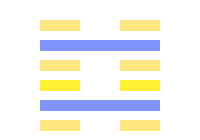
29.2.3.5 (29 > 15) - THE KHAN HEXAGRAM.
- 2. The second line, undivided, shows its subject in all the peril of the defile. He will, however, get a little (of the deliverance) that he seeks.
- 3. The third line, divided, shows its subject, whether he comes or goes ( = descends or ascends), confronted by a defile. All is peril to him and unrest. (His endeavours) will lead him into the cavern of the pit. There should be no action (in such a case).
- 5. The fifth line, undivided, shows the water of the defile not yet full, (so that it might flow away) ; but order will (soon) be brought about. There will be no error.
29.2.3.5 (29 > 15) - Losing ground
One warns one's friends that there will be more difficulties than expected.
Bing DeepL Google Yandex29.2.3.5 (29 > 15) - Losing ground
One warns one's friends that there will be more difficulties than expected.
Bing DeepL Google Yandex29.2.3.5 (29 > 15) - K’ân, l’abîme
K’ān : danger, précipice, caverne. — Tsa k’ān : courir de grands risques ; s’exposer au danger pour un autre.
-
2. Dans les écueils périlleux, si on sait modérer ses sentiments, on pourra en sortir heureusement.
Si on garde la modération. - 3. Si en tout et partout on ne rencontre que danger, que les périls, les sujets de crainte s’accumulent, alors dans un tel danger, il n’y a plus d’expédient qui puisse servir. — Il n’y aura plus de secours possible.
- 5. Mais si le danger n’est pas inéluctable, si une caverne où l’on se trouve n’est point pleine d’eau et qu’on puisse encore aplanir le terrain, on en sortira sans faute. — Il n’arrivera pas malheur.
29.2.3.5 (29 > 15) - Perdre pied
On prévient ses amis que l'on aura davantage de difficultés que prévu.
Bing DeepL Google Yandex29.2.3.5 (29 > 15) - Mélység
- 2. Ha valaki túl nagy nehézségekkel kerül szembe, rá kell hagynia olyanokra akik tudják kezelni azokat.
- 3. Látják amit elrontott így odébbáll.
- 5. Mielőtt visszatérne hogy segítsen másokon, szünetet kell tartania és fel kell készülnie hogy válaszoljon a közelállóknak.

